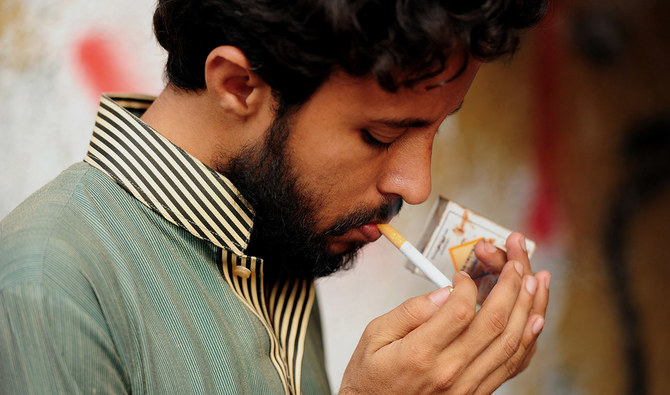KARACHI: Pakistani tobacco companies have witnessed a significant drop in their sales and production as smokers turn to illegal cigarettes following a sharp increase in prices due to the imposition of a 200 percent excise tax, companies and retailers said on Tuesday.
In February, the government introduced the highest-ever excise tax increase for the tobacco industry, raising the Federal Excise Duty (FED) on tier-1 brands by 153.8 percent to Rs16,500 per thousand cigarettes, and by 146.3 percent to Rs5,050 per thousand cigarettes on tier-2 brands.
In Pakistan, where an estimated 17 million adults are smokers, three major cigarette manufacturers hold more than 80 percent of the market share based on the brands commonly used by people.
Pakistan Tobacco Company (PTC), Philip Morris International Pakistan, and Khyber Tobacco Company have market shares of 60.3 percent, 22.6 percent, and 4.9 percent, respectively, while the remaining firms have a 12.2 percent market share, according to the Social Policy and Development Center (SPDC).
“Since June 2022, the tobacco industry has witnessed three excise increases resulting in an overall increase of over 200 percent,” PTC said in an emailed response to Arab News queries on Tuesday.
“In February 2023 alone, the Federal Excise Duty (FED) on cigarettes was increased by approximately 150 percent,” it added. “This increase in excise led to an increase in prices by the legitimate players of the tobacco sector.”
Other cigarette manufacturers also said the tax hike had severely affected their sales, as financial constraints compelled smokers to seek other options, including products that were marketed without paying any duty.
Philip Morris (Pakistan) mentioned a decline of about 70 percent in sales and a 60 percent in production volume in the months of March and April.
“This downward trend is expected to persist in the coming months due to the rise in illicit cigarettes,” the manufacturer said in a statement issued on Monday.
PTC stated that cigarette consumption remained the same in the country, although people were finding it difficult to purchase legitimate cigarette brands due to the prevailing economic situation and were forced to switch to illicit brands.
“These brands sell below the government-mandated Minimum Legal Price (Rs127.4),” it added. “This phenomenon has increased the illicit sector to 43 percent of the total industry from approximately 37 percent in January 2023.”
Inflation in the South Asian state remains stubbornly high due to spikes in the cost of food and energy. The country recorded a multi-decade high inflation rate of 36.4 percent in April 2023, according to the Pakistan Bureau of Statistics (PBS), which also showed that cigarette prices increased by 159.89 percent on an annual basis in the same month.
The rising cost of cigarettes is also impacting the livelihoods of over half a million retailers across the country.
“The price of cigarettes has increased by over 100 percent since February this year, and people are switching to illegal brands,” said Hajji Muhammad Mubeen Yusuf Butt, President of the All-Pakistan Union of Pan Cigarette Beverage Retailers, in an interview with Arab News.
“Consumers are demanding cheap cigarettes, which are mostly illicit. Over 0.7 million retailers can’t afford to sell illegal cigarettes openly [due to legal implications],” he continued, acknowledging that some individuals, but not retailers, were involved in the illicit trade. “They make these sales secretly.”
Pakistani manufacturers called for FED rationalization, stating that the illicit trade of cigarettes would also impact the government’s revenue collection.
“The government is expected to lose over Rs200 billion in terms of revenue due to the illicit trade in cigarettes,” PTC said.
Pakistan has introduced and implemented the Track and Trace System (TTS) to monitor production and sales in the sugar, tobacco, and fertilizer sectors.
“Track and Trace is a good initiative of the government that must be implemented at all cigarette manufacturing facilities across the board, including those in Azad Jammu and Kashmir (AJK),” said an official of the Federal Board of Revenue (FBR) who declined to be named, as he was not authorized to speak to the media, in an interview with Arab News.
“TTS has produced the desired results in terms of enhanced revenue generation,” he added.
The FBR spokesperson did not respond to queries regarding the agency’s actions against the sales of illicit cigarettes in the country.
















